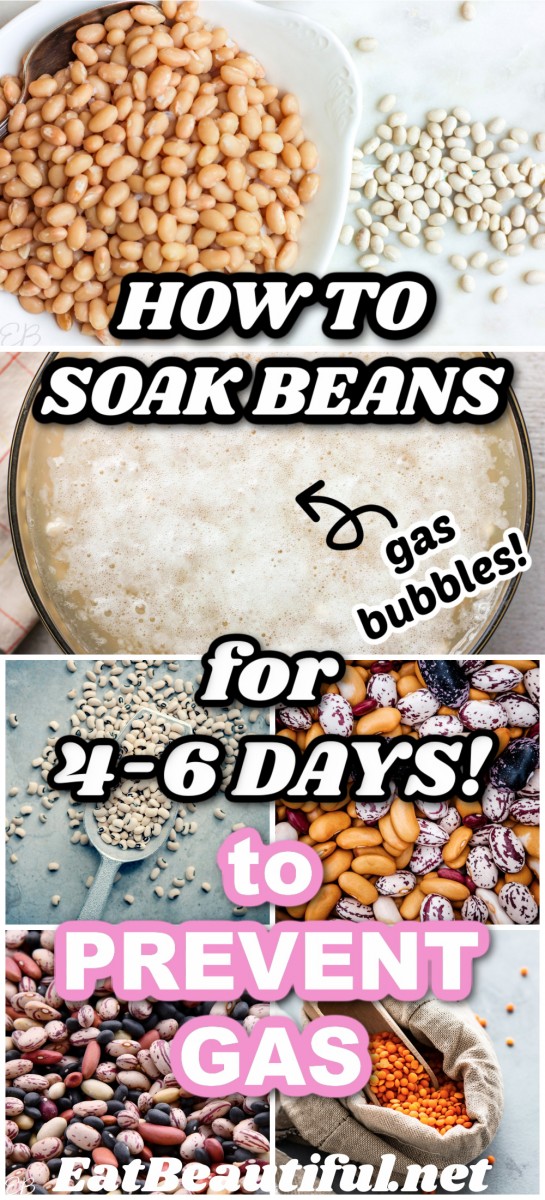
Cook Fill a large saucepan or pot halfway with new water enough to cover the beans by approximately 1 inch. After soaking and sprouting your beans or grains there are various cooking options.

Soak for 24 hours.
How to make canned beans more digestible. Green offers more specific help for combating digestion issues. She advises purchasing fresh beans which is a good idea no matter what. She also recommends soaking and rinsing the beans to remove some of the starches that cause upset.
Use spices such as fennel turmeric ginger cumin and turmeric when cooking beans. These spices are known to enhance digestion and decrease gas in the gut. Use a mix of your favorites or pick one or two to add to the cooking water or in any dish that calls for beans.
Be sure to rinse canned beans. Seaweeds like kombu or kelp help make beans more digestible plus they add a little bit of extra vitamins and minerals. You could also add spices that aid digestion like fennel cumin or ginger.
1 Increase your bean consumptiongradually. Per the above eating more and more legumes will encourage a greater presence of the enzyme we need to digest them and help to get you over your fear of the mighty bean. Try adding them into your diet in.
Introduce beans a quarter cup at a time into your diet. Slowly increase the quantity until you can handle a full serving without reacting. Cooking your beans in water with a more alkaline pH or fermenting your beans can help to reduce their oligosaccharide content even more.
If these strategies arent helping your bean-related digestion issues remember that beans can all be very different from one another. Kombo is a seaweed vegetable that contains the enzyme that can break down oligosaccharides which helps to make beans digestible. If you feel that pre-soaking the beans and then cooking those takes too long and you want to go the canned route then make sure.
Cooking With Canned Beans - When you use beans from a can or jar make very sure that the beans are thoroughly cooked soft and not crunchy. Drain and rinse the beans before adding them to whatever dish you are making. This makes them easier to digest.
I learned even more about them at the Institute for Integrative Nutrition. You should know though that even if you were to follow all of those rules you might still not be able to digest beans. They are a tough one for anyone with digestive problems.
Just listen to your body. Updated in 2019 to add. HERE is one more way to enjoy beans.
Thankfully soaking your beans in water can help. Some of the indigestible fibers will leach out and transfer to the water which leaves the remaining beans easier to digest. Next soaking has an additional benefit for beans as well as grains nuts and seeds.
Canned beans tend to be better digested than dried beans for the same reason as above. Their gas-forming sugars are leached out into the water theyre canned in. Buying your beans canned is a convenient way to eat pre-soaked beans in a pinch.
Simply rinse and strain before eating. Reduce Your Portion Size. Place beans in large bowl.
Cover by about 2 inches with room temperature water. Soak for 24 hours. Pour beans into a colander and rinse them well.
Place beans back into bowl and again cover by 2 inches with water. Repeat this process for a. Actually there is a plausible explanation why sprouting beans might make them more digestible.
Beans contain lots of complex carbohydratessugar molecules that are bound together into larger molecules. During digestion enzymes snip the bonds holding the sugars together so that they can be absorbed. How To Cook Beans For Better Digestion.
The freshness and quality of the foods we eat can transform the taste of our meals and the state of our health. And for me theres definitely a much greater sense of satisfaction and pride that I get from knowing that I. After soaking and sprouting your beans or grains there are various cooking options.
Either can be boiled in water in a regular saucepan. Most larger beans will cook within 1½ to 3 hours at a low simmer and lentils and whole grains will cook in 20 to 30 minutes. You can also use a slow cooker pressure cooker or rice steamer.
Cook Fill a large saucepan or pot halfway with new water enough to cover the beans by approximately 1 inch. Stir periodically until the beans are tender. Cover partially and bring to a boil then reduce to low heat and simmer until the beans are cooked.